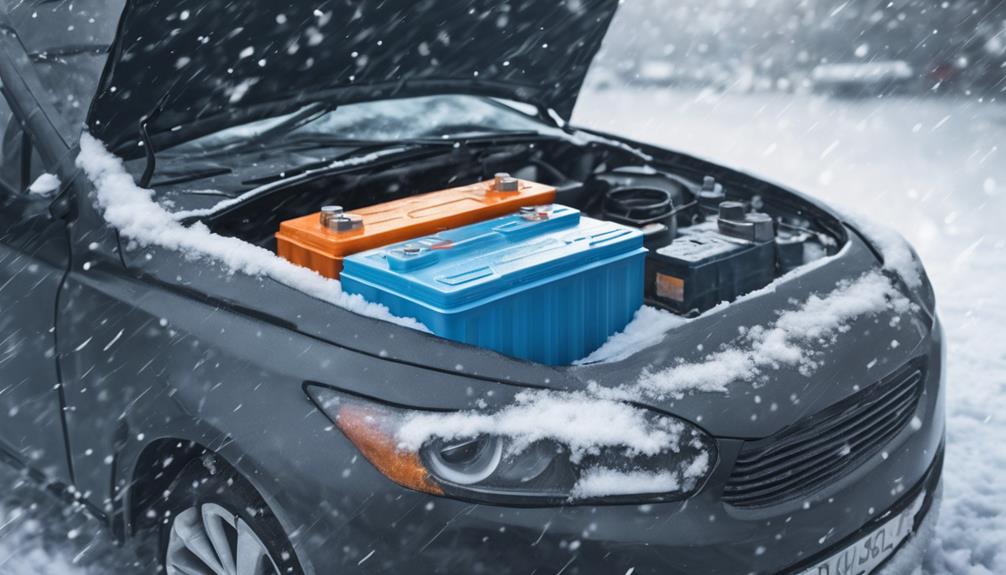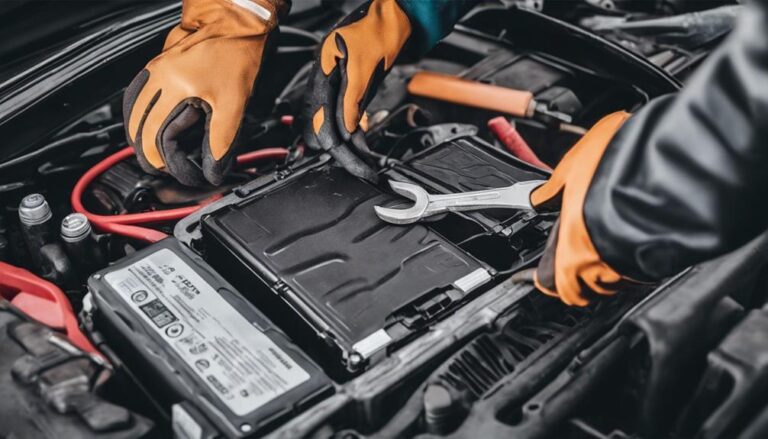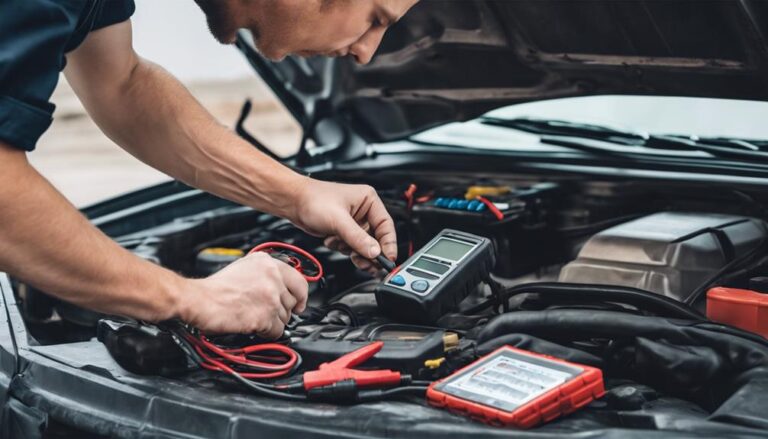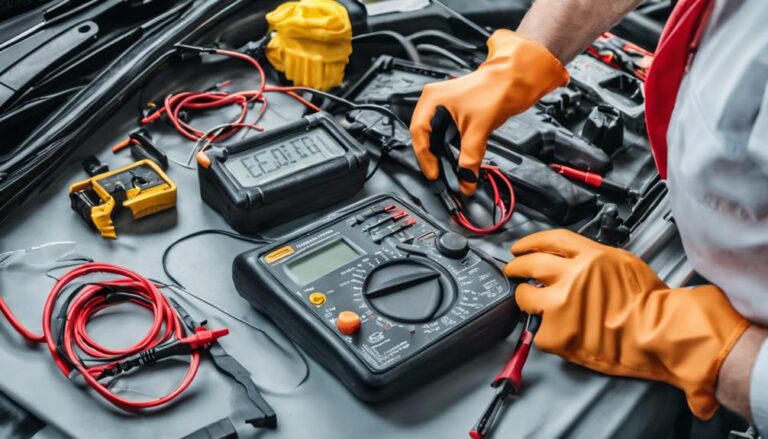Enhancing Battery Performance in Car Repair: Weather Impacts
You may think that car batteries are solely affected by cold weather, but hot weather can also have a significant impact on battery performance. When the temperatures rise, battery fluid can evaporate, causing faster degradation and reducing its overall lifespan.
To combat these effects and enhance your battery's performance, certain precautions and maintenance steps can be taken. However, have you considered how weather fluctuations can impact battery efficiency in the long run, regardless of the season?
Stay tuned to discover practical tips for weather-proofing your car battery and maximizing its longevity.
Key Takeaways
- Hot weather accelerates battery wear, consider AGM batteries.
- Cold weather affects battery performance; use high cold-cranking amp batteries.
- Proactive maintenance in both hot and cold weather is crucial.
- Weather testing helps identify battery weaknesses and strengths.
Hot Weather Impact on Car Batteries
In scorching summer temperatures, your car battery's lifespan shrinks as battery fluid evaporates rapidly, heightening the risk of premature failure. Extreme heat accelerates chemical reactions within the battery, leading to faster degradation and potential breakdown.
AAA reported 2 million battery-related service calls in 2022, highlighting the impact of high temperatures on battery performance. To combat the effects of extreme heat, consider opting for a heat-resistant AGM battery that can better withstand hot weather conditions.
Additionally, proactive battery maintenance is crucial in the summer months. Strategies such as parking in shaded areas and utilizing insulating materials can significantly protect your car battery from the detrimental effects of hot weather.
Cold Weather Impact on Car Batteries
As temperatures drop, the impact of cold weather on car batteries becomes increasingly significant, affecting their chemical reactions and performance for ignition. Cold weather slows down the chemical reactions within the battery, reducing its ability to deliver power effectively.
To combat this, batteries with higher cold-cranking amps are recommended as they can provide the necessary power to start the vehicle in cold conditions. Proper maintenance is crucial in cold weather; checking fluid levels and cleaning terminals helps ensure the battery operates efficiently.
Before extreme cold seasons, conducting regular inspections can identify potential issues that may impede the functionality of car batteries. Minimizing battery usage and selecting a battery suitable for cold weather conditions are essential for optimal performance.
Implementing preventive measures such as insulation can help retain the battery's heat and improve its overall efficiency in cold weather conditions. By taking these steps, you can ensure your car battery performs reliably even in the coldest of temperatures.
Battery Testing for Weather Resilience

Subjecting batteries to extreme temperatures is a critical component of assessing their weather resilience and performance. Manufacturers conduct tests to determine how batteries react to hot and cold conditions. Weather testing is essential for identifying battery weaknesses and strengths to ensure optimal performance in various climates.
The evaluation process involves:
- Temperature Cycling: Batteries undergo repeated cycles of extreme temperatures to mimic real-world conditions, assessing how they perform under stress.
- Performance Analysis: Manufacturers scrutinize battery capacity, charge acceptance rates, and overall durability in harsh weather scenarios to gauge their ability to function reliably.
- Longevity Assessment: Testing helps in determining the longevity of batteries in different weather conditions, aiding in the development of weatherproofing technologies for extended battery life.
Understanding how batteries endure weather impacts is vital for selecting the most suitable option tailored to specific climate requirements.
Signs of Weather-Related Battery Wear
Indications of weather-related battery wear commonly manifest through visible signs such as corrosion on battery terminals and swollen battery cases. These signs can be crucial in identifying potential issues early on, preventing further damage through timely intervention. Slow engine cranking in cold weather, dim headlights or interior lights, and unusual smells emanating from the battery are also key indicators of weather-related battery wear. To help you better understand these signs, let's take a closer look at the table below:
| Signs of Weather-Related Battery Wear | Description |
|---|---|
| Corrosion on battery terminals | Visible build-up on terminals |
| Swollen or bloated battery cases | Expansion of the battery case |
| Slow engine cranking in cold weather | Difficulty starting in low temps |
| Dim headlights or interior lights | Reduced brightness |
| Unusual smells from the battery | Strange odors emitting |
Weather-Proofing Your Car Battery

Weather-proofing your car battery can significantly enhance its performance and longevity in various weather conditions. To ensure your battery is well-protected, consider the following:
- Battery Insulation: Utilizing a battery wrap or insulation kit can increase durability by shielding the battery from extreme weather conditions, such as excessive heat or cold. This insulation helps maintain the battery's internal temperature, preserving its functionality.
- Garage Parking: Parking your vehicle in a garage during severe weather provides protection from temperature fluctuations. This shield minimizes the impact of weather on the battery's performance, allowing it to operate optimally for longer periods.
- Trickle Charging: Using a trickle charger in cold weather is essential to maintain the battery's charge. Lower temperatures can cause batteries to lose power more quickly, but a trickle charger helps counteract this issue, ensuring the battery remains operational.
Frequently Asked Questions
Does the Weather Affect Car Battery?
Weather greatly affects car batteries. Humidity and weather patterns impact battery performance. Precipitation can impact battery life. To enhance performance, choose the right battery type, maintain it well, and take preventive measures based on weather conditions.
Does Temperature Affect Battery Performance?
Do temperature fluctuations impact battery performance and longevity? Yes, extreme temperatures can significantly affect batteries. Cold weather diminishes output and charge acceptance, while heat accelerates degradation. Proper temperature management is vital for maximizing battery lifespan.
How Can I Help My Car Battery in Cold Weather?
To help your car battery in cold weather, focus on battery maintenance. Keep it warm with a battery warmer, park indoors, monitor fluid levels, use an insulated blanket, and reduce usage to prevent strain.
What Kind of Weather Condition Drains a Vehicle Battery Quickest?
In extreme heat, above 90°F, your vehicle battery drains quickest due to heightened chemical reactions and fluid evaporation. High humidity levels exacerbate this, leading to faster degradation. These climate variations significantly impact battery lifespan.
Conclusion
In conclusion, it's vital to protect your car battery from extreme weather conditions to ensure optimal performance.
Did you know that for every 10°F increase in temperature, a car battery's lifespan can decrease by up to 50%?
By implementing proper maintenance strategies and weather-proofing techniques, you can extend the longevity of your battery and avoid unexpected breakdowns.
Stay proactive and keep your battery in top condition to avoid costly repairs.







